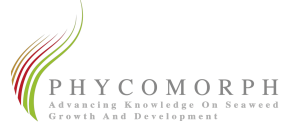COST Action FA 1406 Phycomorph
COST Action FA 1406
COST Action Phycomorph
Image: COST Action FA1406PHYCOMORPH is an international academic network comprising research teams dedicated to the identification of the biological events governing the development of macroalgae
The COST Action Phycomorph ended in 2019
Crossing the kingdoms: Macroalgae-Bacteria Interactions:
Workshop and Training School of the COST Action FA1406
11th -15th September 2017 (Institute for Inorganic and Analytical Chemistry)
Venue: Institute for Inorganic and Analytical Chemistry, Humboldtsr. 8, 07743 Jena, Germany (MapExternal link)
Workshop: 11th -12th September 2017
"Macroalgae-bacteria interactions promoting algal growth and development"
The main focus of the Workshop is on the cross-kingdom interactions between macroalgae and bacteria. It will cover various aspects of chemical ecology, evolutionary ecology, developmental biology, symbiosis and analytical tools. Current topics are presented by invited speakers, early stage researchers and students. The workshop is open to everybody who is interested in macroalgae-bacteria interactions and morphogenesis of macroalgae.
Training School in Analytical Chemistry: 13th -15th September 2017
"Chemistry of macroalgae: Exploring the chemical nature of seaweed-microbial interactions"
In continuation of the Workshop, a Training School will introduce selected tools in Analytical Chemistry (e.g., metabolomics, isotope labeling, etc.) for deciphering seaweed-microbial interactions. Mainly students and early stage researchers will participate in a hand-to-hand laboratory course. The Training School is open to participating COST countries of the COST Action F1406. Participants of the Training School have been already selected.
Protocols for Macroalgae Research
Bénédicte Charrier, Thomas Wichard, C R K Reddy
April 17, 2018
Published by CRC Press
Reference - 526 Pages - 53 Color & 68 B/W Illustrations
ISBN 9781498796422 - CAT# K30375
Summary
Protocols for Macroalgae Research describes state-of-the-art approaches and applications in seaweed research. The book is comprised of 31 protocols in all and provides critical information regarding the cultivation and preservation of seaweeds, their chemical composition, as well as their cellular and molecular characterization. This type of research is critical and timely, as the last few decades have witnessed remarkable advancements in phycological research worldwide. Consideration of algal resources for food, fuel, chemicals, feed, and fertilizer has furthered the development of diverse laboratory techniques that not only advance their utilization substantially, but also provided new insights in understanding the molecular basis of their form and function. This recent progress has enabled researchers to determine and quantify various metabolites and organic macromolecules such as carbohydrates, proteins, and lipids.
Protocols for Macroalgae Research thus uses macroalgae as a model organism for addressing fundamental research problems. No recent comprehensive literature of this format exists on this topic. As such, this state-of-the-art protocol text both develops and standardizes the various macroalgae approaches located within the field. It does so by featuring a wide-range of protocols from invited experts; each protocol features a brief introductory overview, an inventory of materials and reagents, and step-by-step experimental procedures, which include helpful notes offering care and cautions. This protocol book is an invaluable reference for beginning and preexisting researchers within the field of macroalgae.
Special issue in Botanica Marina
Botanica Marina 2017 | Volume 60 | Issue 2
Special Issue - Phycomorph: macroalgal development and morphogenesis
Issue Editors: Thomas Wichard & Christos Katsaros
Short term scientific missions within COST Action FA1406
Visiting scientists and their research topics in our lab in Jena (funded by the COST Action FA1406)
|
Participant |
Home university |
Duration |
Topic |
|
Fatemeh Ghaderiardakani |
University of Birmingham (UK) |
01/07/15 |
Know-how of cultivation of Ulva mutabilis: axenicity, gametes and spores release |
|
Dr. Bénédicte Charrier |
Station Biologique Roscoff (FR) |
24/01/16 |
Handling transgenic lines of Ulva mutabilis |
|
Xiaojie Liu |
Ghent University (BE) |
11/01/16 |
Culturing and crossing of Ulva mutabilis |
|
Mark Polikovsky |
Tel-Aviv University (IL) |
01/02/16 |
Preparing axenic Ulva spp. and bacterial isolation and cultivation |
|
Dr. Mahasweta Saha |
University of Essex (UK) |
15/02/17 |
Characterizing and investigating the morphogen role of volatile metabolome of Ulva mutabilis epibacteria |
|
Rawda Saad |
Alexandria University (EGY) |
14/01/18 |
Effects of ocean acidification on macroalgae and signalling molecules produced by associated bacteria |
|
Omri Nahor |
Tel-Aviv University (IL) |
14/01/18 |
Starch production during gametogenesis in Ulva species: potential applications for a sustainable and profitable cultivation |
|
Dr. José Pintado |
Instituto de Investigacións Mariñas (ES) |
09/12/2018 |
Exo-Metabolomic profiling in the study of the effect of light on Phaeobacter gallaeciensis biofilms on Ulva ohnoi (Ulvales, Chlorophyta) |
|
Dr. Kenny Bogaert |
University Ghent (Be) |
17/02/2019 23/02/2019 |
Identification of the polarisation inhibiting pheromone in Dictyota dichotoma. |
